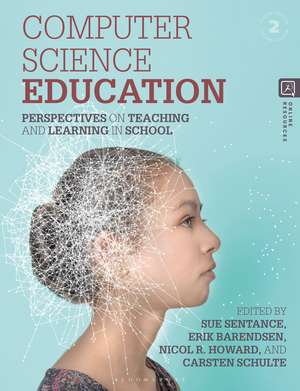Computer Science Education: Perspectives on Teaching and Learning in School
Editat de Dr Sue Sentance, Professor Erik Barendsen, Dr Nicol R. Howard, Professor Carsten Schulteen Limba Engleză Paperback – 22 feb 2023
| Toate formatele și edițiile | Preț | Express |
|---|---|---|
| Paperback (1) | 180.88 lei 3-5 săpt. | +44.79 lei 6-12 zile |
| Bloomsbury Publishing – 22 feb 2023 | 180.88 lei 3-5 săpt. | +44.79 lei 6-12 zile |
| Hardback (1) | 505.42 lei 6-8 săpt. | |
| Bloomsbury Publishing – 8 mar 2023 | 505.42 lei 6-8 săpt. |
Preț: 180.88 lei
Preț vechi: 208.22 lei
-13% Nou
Puncte Express: 271
Preț estimativ în valută:
34.61€ • 37.01$ • 28.86£
34.61€ • 37.01$ • 28.86£
Carte disponibilă
Livrare economică 27 martie-10 aprilie
Livrare express 12-18 martie pentru 54.78 lei
Preluare comenzi: 021 569.72.76
Specificații
ISBN-13: 9781350296909
ISBN-10: 1350296902
Pagini: 336
Ilustrații: 10 bw illus
Dimensiuni: 189 x 246 x 22 mm
Greutate: 0.45 kg
Ediția:2
Editura: Bloomsbury Publishing
Colecția Bloomsbury Academic
Locul publicării:London, United Kingdom
ISBN-10: 1350296902
Pagini: 336
Ilustrații: 10 bw illus
Dimensiuni: 189 x 246 x 22 mm
Greutate: 0.45 kg
Ediția:2
Editura: Bloomsbury Publishing
Colecția Bloomsbury Academic
Locul publicării:London, United Kingdom
Caracteristici
Comprehensive coverage from world-leading experts including Tim Bell, Paul Curzon, Quintin Cutts, Jill Denner, Ira Diethlem, Shuchi Grover, Maya Israel, Tia Madkins, Juha Sorva, and Matti Tedre.
Notă biografică
Sue Sentance is Chief Learning Officer at the Raspberry Pi Foundation and Director of the Raspberry Pi Computing Education Research Centre at the University of Cambridge, UK. Erik Barendsen is Professor of Computer Science Education at the Open University, the Netherlands, and Professor of Science Education at Radboud University, the Netherlands. Carsten Schulte is Professor of Computer Science Education at the University of Paderborn, Germany, and Head of the Computer Science Education Research Group. Nicol R. Howard is Associate Professor and Associate Dean of Academic Affairs in the School of Education at the University of Redlands, USA. She is also co-director of the Race in Education Analytics Learning Lab (REAL Lab).
Cuprins
PrefaceForeword to the 2nd editionAcknowledgementsPart I: Positioning Computer Science in Schools1. Introduction to Part 1, Carsten Schulte (University of Paderborn, Germany)2. The Nature of Computing as a Discipline, Matti Tedre (University of Eastern Finland, Finland)3. Perspectives on Computing Curricula, Erik Barendsen and Mara Saeli (Radboud University, The Netherlands)4. Computer Science, Interaction, and the World -The ARIadne Principle, Carsten Schulte, Felix Winkelnkemper and Lea Budde (University of Paderborn, Germany)5. Computational Thinking: A Competency Whose Time Has Come, Shuchi Grover (SRI International's Center for Technology in Learning, USA) and Roy Pea (Stanford University, USA)6. Learning Machine Learning in K-12, Ilkka Jormanainen, Matti Tedre, Henriikka Vartiainen, Teemu Valtonen, Tapani Toivonen and Juho Kahila (University of Eastern Finland, Finland)Part II: Computing for All: Equity and Inclusion7. Introduction to Part 2, Nicol R. Howard8. Equity and Inclusion in Computer Science Education: Research on Challenges and Opportunities, Jill Denner and Shannon Campe (Education, Training, and Research, USA)9. Engaging Culturally Relevant and Responsive Pedagogies in Computer Science Classrooms, Tia C. Madkins (The University of Texas at Austin, USA) and Nicol R. Howard (University of Redlands, USA)10. Increasing access, participation, and inclusion within K-12 CS education through Universal Design for Learning and High Leverage Practices, Maya Israel, Latoya Chandler, Alexis Cobo and Lauren Weisberg (University of Florida, USA)Part III: Teaching and Learning in Computer Science11. Introduction to Part 3, Erik Barendsen (Radboud University & Open University, The Netherlands)12. Teaching Computing in Primary Schools, Tim Bell (University of Canterbury, New Zealand) and Caitlin Duncan (Osaka University, Japan)13. Teaching of Concepts, Paul Curzon, Peter W. McOwan, James Donohue, Seymour Wright and William Marsh (Queen Mary University of London, UK)14. Language and Computing, Ira Diethelm, Juliana Goschler, Timo Arnken (Carl von Ossietzky Universität - Didaktik der Informatik, Germany) and Sue Sentance (University of Cambridge, UK)15. Investigating Attitudes towards Learning Computer Science, Quintin Cutts and Peter Donaldson (University of Glasgow, UK)16. Formative assessment in the Computing Classroom, Sue Sentance (University of Cambridge, UK) and Shuchi Grover (SRI International's Center for Technology in Learning, USA)Part IV: A Focus on Programming17. Introduction to Part 4, Sue Sentance (University of Cambridge, UK)18. Principles of Programming Education, Michael E. Caspersen (It-vest - networking universities, Denmark)19. The Role of Design in Primary (K-5) Programming, Jane Waite (Raspberry Pi Foundation, UK)20. Misconceptions and the Beginner Programmer, Juha Sorva (Aalto University, Finland)21. Programming in the Classroom, Sue Sentance (University of Cambridge, UK) and Jane Waite (Raspberry Pi Foundation, UK)22. Epistemic Programming, Sven Hüsing, Carsten Schulte and Felix Winkelnkemper (University of Padeborn, Germany)GlossaryIndex
Recenzii
This updated edition reflects developments in Computer Science (CS) education in accessible way and with strong emphasis on inclusion and social justice. The authors, leaders in the field, offer an international perspective on theoretical and practical considerations for teaching CS. An important textbook for preservice and inservice CS teachers.
Curated and crafted by international leaders in computer science (CS) education. They strike a balance between research, practice and thoughtful discussion, presenting evidence-based K-12 CS education in an accessible way. An ideal textbook for any teacher education program or of interest to practising teachers wishing to upskill or refresh in CS education.
Curated and crafted by international leaders in computer science (CS) education. They strike a balance between research, practice and thoughtful discussion, presenting evidence-based K-12 CS education in an accessible way. An ideal textbook for any teacher education program or of interest to practising teachers wishing to upskill or refresh in CS education.
